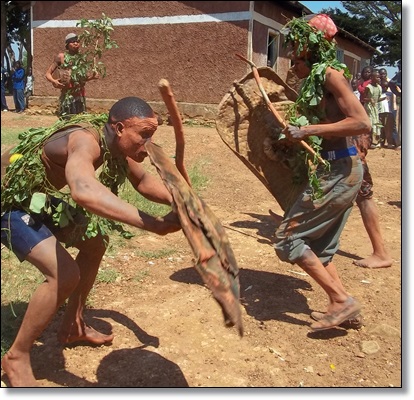Africa: The Loss of Cultural Ownership

 |
| Young men in a cultural mock fight |
Like avoiding an elephant in the middle of downtown New York, Whites have an amazing way of talking around the subject of economic ownership in this department.
Most Books, Films, News on Africa is owned by Whites. In terms of engaging culture as a business, Africa is asleep or late of the starting block to recognize new opportunities and move into our own cultural niches before they become dominated and controlled by others.
Almost every major organization rooted in “doing” something for Africans or “saving” Africans from something is European dominated. Most cultural products sold as African include Africans as bottom recipients in the economic food chain.
African-Americans are very famous for hip-hop, the world sees the African stamp on this genre. Some individual rappers get rich from it (0.00001%) but who gets wealthy from it? Who shoots the videos and owns the labels? Or the record shops? The clothes they wear? The cars they drive? The greatest Jazz artist is Norah Jones, the greatest rap artist is Emenim, while the greatest rock ‘n roll artist is Elvis; the current greatest reggae artist is Sean Paul.
African created, the jazz but they did not write the history or own any aspect beyond some royalties. The entire jazz creation has done more economically for European Americans than African-Americans.
An independent African run site did a survey “are we better off today, compared to yesterday?” 70% of the people recognized “we are worst off today but richer.” The glorious efforts in America in the 60’s, under segregations, had more elements of self-determination and agency that today. More business ownership and more importantly a do-for-self attitude. Wade in Senegal gave Asians $28 Million to build an African monument. The Zulu cultural department had no problem, nor saw a conflict of agency when they gave a White-Boer artist R3 million to build a statue of the warrior Shaka Zulu, he made it look weak so they did something smart, they let him try again. 10,000 years of sculpting and crafting the African artist is never seen "valuable" enough to be given the opportunities to represent African culture.
Despite being the first people on the planet, Africans still do not know how to grow their own crops on a large commercial scale, or how to build our own bridges, refine oil, process diamonds, or even build highways without help from "the other." Sending people to learn these skills, as the Japanese did, never occurred to the dependent minds of African leadership. The largest dealer in African art, are not Africans. The best-selling books on any aspect of Africa is again, not largely African. If South Africa is selling its trade mark vuvuzela on a commercial scale be sure the company owning the product is majority white.
Neil van Schalkwyk says his firm has sold 1.5m vuvuzelas in Europe since October 2010 and expects sales of up to 20 million rand ($2.6m; £1.7m) over the course of the South African 2010 football. Brandon Bernardo of the vuvuzela.co.za website told Reuters news agency they could churn out at least 10,000 instruments a day. So the musical cultural icon of South Africa profits everyone but the native South Africans. Africans are blowing it but someone else is owning it. And in all of the debate these issues never seem to be mentioned.
Search the internet, and look at popular sites to do with African people and see who and what is in control of it. When you go to see Zulu dancing in South Africa, it is rarely owned (if ever) by African people. The themes are African, the aesthetic is African but the ownership is 100% White. Pick up a CD in the airport in Kenya featuring African music, again products made by Africans but not owned by Africans. A large format table book on "tribes" of the Sudan, written by two Italian women. A film festival showcasing the best of African cinema, where not only are the majority of the films made by Europeans but the festival is also run by Europeans (like Durban International Film Festival).
By Owen 'Alik Shahadah
Director, African writer, and scholar. Courtesy: African Holocaust
